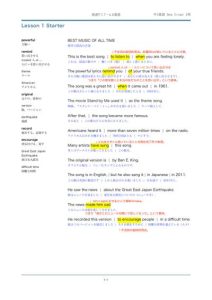英語力上達のための手っ取り早い手段として、さまざまな英文を読むという方法がありますが、他の箇所でも書いたように(『対訳「A MUJINA」』参照)中学生が読んで楽しめる文章は限られてきます。ところが高校生や大学受験生が読む英文ということになると非常にバリエーションに富んでおり、内容も難易度も多岐に渡っています。特に大学入試問題の中に良い英文が多数存在するため、こういったものを楽しみながら読めば、知識や教養が増すと同時に、英文読解力も向上します。そのため私が担当する生徒に対しては、そういう類の英文をテキストとして利用してきました。面白い素材を使えば生徒の関心も増し知的満足度も高いことから、高校生に英語を教えている人々には(自らの目と感性を最大限活用して)そういう素材をぜひ選んでもらいたいと思います。
そういった大学入試問題の中でも、2010年前後の大学入試センター試験の読解問題は内容が面白く、私も感心することがたびたびありました(もっとも2015年頃から質が落ちてきましたが)。とりわけ2012年の第6問は内容が非常に面白く意外性があり、英文自体は入試英文の傑作の1つではないかと感じたほどです。そこで今回は、その英文を紹介しようと思います。「procrastination」という難しい単語が随所に使われていますが、文章を読めば自然に意味を理解できるようになっているため、この単語の意味を問うような問題が出ていても良かったほどです。
なお、今回も対訳を付けました(対訳は、自然な日本語にするため、かなり意訳しています)。(内容を理解した上で)何度も口に出して読めば、英語読解力を向上させることができます。

(1) A high school student has a science test on Monday but spends most of the weekend playing video games and does not start studying until late Sunday night. This kind of avoiding or delaying of work that needs to be done is called procrastination. It has been estimated that up to 95% of people procrastinate at least sometimes, and about 20% of them do it too much. Traditionally, people who procrastinate have been considered lazy, but research tells us that this is not true. Learning about the roots of procrastination can help us understand why most people do it to some extent and also help us decrease our own procrastination. Although researchers do not agree on all the reasons behind procrastination, there is general agreement about some factors that can explain it.
(1) 月曜日に理科の試験が控えている高校生。それにもかかわらず、週末のほとんどをテレビゲームで遊んでしてしまい、勉強に手をつけたのは日曜日の夜になってからだ。このように、しなければならない作業をやらなかったり始めるのを遅らせたりすることは、先延ばしと呼ばれている。最大で95%の人が少なくとも何らかのものを先延ばししており、約20%が先延ばしの度が過ぎていると考えられている。これまで、先延ばしはその人が怠慢であるせいだと考えられてきたが、研究からはそれが事実でないことがわかっている。先延ばしの根源について知れば、ほとんどの人々がなぜ一定程度先延ばししてしまうのかがわかるだけでなく、自分自身の先延ばしも減らすことができる。先延ばしの原因とされているもの全部について、すべての研究者が同意しているわけではないが、一部の要因については、十分その説明になっているということで、概ね合意が得られている。
(2) The first factor is how pleasant or unpleasant people find a task. Research shows that people will put off tasks they find unpleasant. Many high school students may delay cleaning their rooms or doing their homework. However, many might not delay doing such tasks as responding to a friend’s email. It is important to remember that whether or not a task is pleasant depends on the individual. For example, someone who loves bicycles might not delay fixing a punctured tire while someone who does not may put it off.
(2) このような要因の中で真っ先に挙げられるのは、ある作業に対する感覚、つまりそれが好きかどうかということである。研究からは、嫌な作業は先延ばしされがちであることがわかっている。多くの高校生は、部屋の掃除や宿題については先送りしがちであるが、一方で彼らの多くは友だちのメールに返信するなどという作業は先送りしないだろう。人によってある作業が好きか嫌いかは異なるが、これも重要なポイントになる。たとえば、自転車が大好きな人であればタイヤのパンク修理を先に延ばしたりしないが、好きでない人であれば先に延ばすことが十分ありうる。
(3) In addition to how people feel about the job at hand, the amount of confidence they have in their ability to do a task is also related to procrastination. For instance, those who have low expectations of success are more likely to postpone starting a particular job. Conversely, those who believe that they can perform well are more likely to take on challenging tasks rather than avoid them. It should be noted, though, that some counselors argue that too much confidence can also lead to procrastination: some people overestimate how easily they can do a particular task and start too late.
(3) 目の前にある作業を人がどう感じているかという要因に加え、その作業をどの程度やり遂げられるかという自信も、先延ばしに関係してくる。たとえば、ある人が特定の作業について成功の可能性が低いと考えている場合などは、その作業の開始を遅らせがちである。逆に、うまくやり遂げられると思っている人は、難しい作業であっても、それから遠ざかるのではなく率先して取り組むような傾向がある。だが一方で、自信がありすぎる場合も先延ばしに繋がると指摘するカウンセラーもいる。つまり、特定の作業について必要以上に簡単にやり終えられると過信していることから、開始するタイミングが遅くなりすぎるというわけである。
(4) Another factor is whether or not people can exercise self-control. Those who have less self-control can easily be drawn away from their work. Accepting an invitation to sing karaoke on a night when you planned to start working on a presentation could be one example. Self-control, or the ability to resist temptation and stick to a plan, is something many of us struggle with. Interestingly, age is said to be associated with self-control. Research shows that the older people become, the less likely they are to delay doing their work until the last minute.
(4) 他に、その人にとって自己管理が得意かどうかという要因もある。自己管理があまりうまくない人は、やるべき作業からすぐに距離を置いてしまう。プレゼンテーションの準備を始めるつもりでいたのに、その夜カラオケに誘われて一緒に行ってしまったなどというのがその例である。自己管理の能力、つまり誘惑に打ち克って計画をそのまま実行するような能力は、私たちの多くが何とか身につけようとしながらなかなか身につけられないでいるものである。興味深いことだが、年齢が自己管理に関係しているとも言われている。研究によると、年齢が高い人ほど、作業をギリギリまで先送りするということが少なくなるらしい。
(5) Lastly, there is a link between procrastination and how long people must wait before they see the reward for an effort. For instance, studying hard in school might not give high school students any immediate rewards; what they learn might not seem useful to the present. However, studying can provide them with rewards in the future like the knowledge or skills necessary to pursue their dreams. Sometimes, it is hard to see the benefit of making an effort when the reward is too far away. This can explain why many people do not start saving money for their old age when they are young.
(5) 最後の要因として、先延ばしは、努力の成果が現れるまでの時間とも関係している。たとえば、高校生が学校で一生懸命勉強したとしても、それがすぐに成果となって現れることはあまりない。そもそも学習したこと自体、現時点で役に立つとは思えないことが多い。しかし学習した内容は、夢を実現する上で必要な知識や技能という形で、将来的に成果として現れるかも知れないのである。成果があまりに先にある場合、努力の見返りを実感することは往々にして難しいものだ。多くの若者は自らの高齢化に備えて貯金を始めたりしないものだが、その理由もこれに関係している。
(6) What are the roots of your procrastination? Because the behaviors described here seem common to most people, you do not need to completely change your habits if you only procrastinate once in a while. On the other hand, if you feel that your procrastination is a problem, the first step to reducing it is identifying the reasons behind it. Self-help books and websites give numerous techniques for overcoming procrastination, but it is only by understanding the roots of the problem that you can choose the appropriate method for yourself.
(6) 先延ばしの根源は何だろうか? ここで紹介した行動はほとんどの人に共通するものと考えられるため、たまにしか先延ばししない人であれば、習慣をことさら変えたりする必要はない。一方で、先延ばしの習慣が自分にとって大きな問題になっていると感じているような場合は、先延ばしを減らすための第一歩として、まずその原因を認識することが必要になる。自己啓発本やウェブサイトでも先延ばしを解消するためのさまざまな方法が紹介されてはいるが、自分に適した方法を選ぶには、問題の根源について理解することが絶対に必要なのだ。

A 次の問い(問1〜5)の46〜50に入れるのに最も適当なものを、それぞれ下の(1)〜(4)のうちから一つずつ選べ。
問1 According to paragraph (2), [ 46 ].
(1) people do not forget unpleasant tasks
(2) people who love bicycles learn to fix tires fast
(3) people will find different tasks pleasing
(4) people will put off tasks to write emails
問1 第(2)段落によると、[ 46 ]。
(1) 人は、嫌な作業を忘れることはない。
(2) 自転車が大好きな人は、タイヤの修理方法を速く憶える。
(3) 好きな作業は人によって異なる。
(4) 人は、メールを書くという作業を先延ばしする。
問2 Paragraph ⑶ implies that [ 47 ].
(1) people with low confidence in their ability will start a job earlier
(2) people with reasonable confidence in their ability procrastinate less
(3) people’s confidence to do a task is not associated with procrastination
(4) some counselors overestimate the confidence of their clients
問2 第(3)段落によると、[ 47 ]。
(1) やり遂げられる自信があまりない人は、仕事を早めに始める。
(2) やり遂げられる自信がそれなりにある人は、あまり先延ばししない。
(3) 人が作業をやり遂げられるという自信は、先延ばしと関係ない。
(4) あるカウンセラーは、彼らの顧客の自信を過大評価している。
問3 According to paragraph ⑷, [ 48 ].
(1) older people tend to demonstrate more self-control
(2) people usually exercise self-control without struggle
(3) self-control is the eagerness to accept invitations
(4) younger people are willing to resist temptations
問3 第(4)段落によると、[ 48 ]。
(1) 年齢が高い人は、自己管理能力が高い傾向にある。
(2) 人は通常、別段がんばらなくても、自己管理を遂行できる。
(3) 自己管理は、誘いを受け入れようとすることである。
(4) 若い人々は、誘惑に抵抗しようとする。
問4 Paragraph (5) argues that many people start saving for old age late because [ 49 ].
(1) old age seems too distant in time
(2) the length of time to old age varies
(3) there are other things to worry about
(4) there will be little benefit
問4 第(5)段落では、多くの人が高齢化に備えて貯金を始めたりしないのは、[ 49 ]からだと主張している。
(1) 高齢期が時間的に遠いように思える
(2) 高齢化するまでの時間の長さが変動する
(3) 心配すべきことが他にある
(4) 見返りがほとんどない
問5 The author’s main argument is that [ 50 ].
(1) many people agree about the four explanations of procrastination
(2) people who procrastinate are no longer thought of as lazy
(3) procrastination has become problematic in our society
(4) we can manage our procrastination by understanding its sources
問5 著者の主要な議論は、[ 50 ]ということだ。
(1) 多くの人々が先延ばしの4つの説明について同意する
(2) 先延ばしする人はもはや怠惰と見なすことができない
(3) 先延ばしは私たちの社会で問題になっている
(4) 私たちは原因を理解することによって先延ばしを管理できる
B 次の表は、本文の段落と内容を表すものである。51〜54に入れるのに最も適当なものを、下の(1)〜(4)のうちから一つずつ選び、表を完成させよ。ただし、同じものを繰り返し選んではいけない。
| Paragraph | Content |
| (1) | 51 |
| (2) | 52 |
| (3) | The belief in your abilities |
| (4) | The ability to keep to a task |
| (5) | 53 |
| (6) | 54 |
| 段落 | 内容 |
| (1) | 51 |
| (2) | 52 |
| (3) | 能力への信頼 |
| (4) | 作業に執着し続ける能力 |
| (5) | 53 |
| (6) | 54 |
(1) The appeal of a task
(2) The phenomenon of procrastination
(3) The timing of realizing future gains
(4) The way to deal with procrastination
(1) 作業の魅力
(2) 先延ばしという現象
(3) 将来の利益を理解するタイミング
(4) 先延ばしに対処する方法












